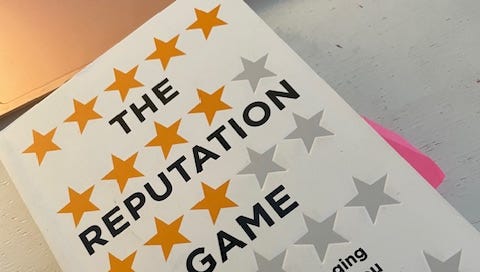“There are three ‘dice’ in the reputation game: behaviours, networks and narratives.”
This opening sentence of The Reputation Game by Rupert Younger and David Waller has been informative for me both in my writing and my work. The sentence, and the rest of the book, has really deepened my thinking about the difference between personal branding and reputation management; two things that people tend to conveniently conflate.
Start with narratives
In personal branding, the starting-point is narratives. What do I want to talk about, what is the language I use, what are the stories I tell? This is extremely valuable work, and forms the foundation of what I’ve done with executives and clients since my first-ever executive communications gig in 2012. And the deeper people are prepared to dive into these topics, the better the outcome for them. If you keep it superficial, that is how things remain. If you’re prepared to be vulnerable, and dig deep, then we have a set of foundational narratives that help you talk about your life, work and expertise upon which you can build your authority.
I just saw this quote from David Lynch quoted on the London Writers’ Salon Substack:
Ideas are like fish. If you want to catch little fish, you can stay in the shallow water. But if you want to catch the big fish, you’ve got to go deeper. Down deep, the fish are more powerful and more pure. They’re huge and abstract. And they’re very beautiful.
David Lynch - Catching the Big Fish
When thinking about narratives, it’s good remember the insights from Frank Wolf, whose book The Narrative Age I reviewed recently. According to Frank, stories build narratives, and narratives build reputation.
How does that look in practice?
One way is to work backwards. Let’s say, you’d like to have a personal brand for being an innovator in your industry, and you’d like to help others innovate. Think of the narrative pillars that could support that reputation: these could be innovation expertise, innovation openness and a willingness to accept change. Then think of the stories from your career that support each of those pillars - what are the moments in which you demonstrated or deepened your expertise, what are the moments where you were challenged to demonstrate that you were open to new innovation, and where you showed a willingness to change. Find ways to tell those stories.
Another way is be aspirational. Let’s say you’d like to be seen as an industry rebel, someone who’s succeeding by breaking the rules. You build your brand by demonstrating non-conformist opinions, being a bit spiky and telling stories about ways you’ve succeeded in the past by doing things differently.
Thinking about behaviours
According to Younger and Waller, ‘Reputation is not just concerned with our beliefs or actions. Our observed behaviour affects status, trust and reciprocity.’
In that last sentence, the word ‘observed’ is carrying all the weight. How you behave, and how you are seen to behave, has an outsized effect on your reputation. If you want to be seen as the rebel CEO and you have spiky opinions on how to move fast and break things, but your employees and other audiences observe you being a stickler for rules and processes then there’s a say/do gap that’s damaging your reputation. If you’re talking about innovation but you write long, wordy posts in the passive voice with multi-hyphenate, academic words, you’re going to come across as fusty.
Consistency takes you out of the space of personal brand and into the realm of reputation. In the reputation process that work on one-to-one with leaders and executives, I do intensive interviews with people in their network to ensure exactly this: that what they say about themselves is how people observe and experience them. If there are no gaps, their reputation is intact. If there are gaps, then these are amber flags we can fix.
It’s hard to know ourselves well enough to know if we’re being consistent, which is why it helps to work with a reputation coach like me. Waller and Younger say that ‘your behaviour is the message’ and this is quite radical: not your words; your behaviour. So many leaders and executives neglect this part of the work.
And then networks
Networks used to mean our families, clubs, offices and alumni groups, but social media exploded that. Unless you’re a hermit or have sworn off social completely, you exist in concentric circles of influence starting with your family and friends, moving out to your work colleagues and from there to your connections and followers on different platforms.
And as Waller and Younger say, ‘Put bluntly, if no one knows you, you don’t have a reputation.’ They differentiate between closed networks where ties are strong (families, companies, school alumni groups) and open networks (such as LinkedIn) where ties are weaker. In closed networks there is trust between individuals and more efficiency and coherence of information. The downside is that these can become echo chambers. In open networks, there is less trust and more creativity. Ideas fly around faster.
In open networks, new ideas and the time and the ability to travel around different groups of people, growing and changing until they become fully formed and valuable. Reputation in open networks becomes a mechanism through which new ideas propagate and evolve, whereas reputation in closed networks primarily drives efficiency.
Waller and Younger - The Reputation Game
Our reputations are the aggregate of our narratives, behaviours and networks. This is why I advocate for an evolution of the idea of personal branding to include thinking about behaviour and networks. There is absolutely no point in an executive or leader working on their personal brand, but refusing to think deeply about behaving consistently or refusing to show up on any networks beyond their most immediate ones. If no one knows you, you don’t have a reputation.





